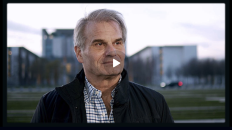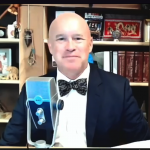On the evening of July 17, 1996, at 8:19 p.m., TWA Flight 800, a Boeing 747, took off from Kennedy Airport, bound for Paris. At 8:31 p.m., over 730 people watched Flight 800 explode, killing all 230 of the people aboard.
Not long afterwards, millions of Americans watched their televisions in fascinated horror as search and rescue crews looked for survivors among the flaming debris. Only dead bodies were recovered.
Flight 800 is mostly an ugly memory for people these days. The U.S. government issued an explanation that a fuel tank had somehow exploded. Yet, they flatly denied any evidence existed of foul play, including the possibility that Flight 800 had been blown out of the air by a missile.
All but a few journalists accepted the government’s version of events. Few bothered to investigate the numerous eyewitnesses, the radar records and the physical evidence that all suggested a strikingly different explanation of Flight 800′s untimely demise. And those few who did question the government’s version were made to look like fools or, worse, thrown in jail and prosecuted as criminals for meddling in an official investigation.
What really happened to Flight 800? In light of recent FBI disclosures of buried evidence that have resulted in a postponement of the execution of convicted Oklahoma City bomber Timothy McVeigh, new questions are being raised about other high-profile U.S. government terrorism investigations – including the explosion of TWA Flight 800 in 1996.
Today, WorldNetDaily begins a daily five-part series of explosive commentaries by independent writer and Emmy-award-winning producer Jack Cashill detailing what he has learned in the course of producing “Silenced: Flight 800 and The Subversion of Justice,” a documentary video which presents compelling evidence that Flight 800 was indeed shot down by missile fire and of the massive cover-up that followed that tragic event by the federal government.
Our dark places
“You don’t want to go there, Jack.”
I do not know how clich?s emerge, but this one seems to have my name on it. I have heard it said in recent weeks more times than I could count or care to recall.
Not from my liberal friends. Willfully clueless the past eight years, these folks have not even heard of, say, Juanita Broaddrick or the Sudanese aspirin factory. Were I to tell them that the Clinton White House covered up a missile strike on an American airline off the coast of Long Island, and that I was producing a documentary about the same, they would think me daft.
My conservative friends, on the other hand, don’t think me daft at all. Most of them believe Clinton corrupt enough to attempt a crime of this magnitude, and half of them think him capable. It is they who don’t want me “to go there.”
“What if all evidence leads in that direction?” I ask.
It doesn’t seem to matter. Like Conrad’s Marlow, these otherwise rational Main Streeters seem “unnerved by a sheer blank fright, pure abstract terror.” I wish I were overstating the problem, but I am not.
Too many ordinary citizens have reconciled themselves to an enduring heart of American darkness, one that can swallow reputations and bank accounts whole and possibly even lives. “Look what they did to Pierre Salinger.” And it is to these dark places they don’t want me to go – even if Clinton no longer mans the gate.
Kelly Creech, my editor on this project, still chuckles when he thinks of my involvement. A Kennedy assassination buff (a troubling zeugma if there ever was one), he has tried to convince me for years of the dark forces that conspired to murder JFK. Something of an idealist, or perhaps just a na?f, I have continued to insist on Lee Harvey Oswald alone, though lately with less vigor. Kelly has been amused to see how this project has opened my eyes. He is eager for the voyage.
So is my intrepid guide, James Sanders. Jim has journeyed up this river before. It cost him everything but his life. Indeed, after writing the best-seller, “The Downing of TWA Flight 800,” he and wife Liz were arrested and convicted of conspiracy, a sad moment in journalism history, all the more shameful for its obscurity. Still, this good-hearted pair of felons remains undeterred – even the sweet, fragile Liz, a former TWA attendant and trainer, whose search for vindication subverts her need for peace.
For all their travails, the Sanders will stay the course. Like me, they believe that the White House has been cleansed with Clinton’s removal, but not redeemed. Redemption will come not by “moving on” but by “going there” wherever it is the truth takes us, no matter how disturbing that truth might be.
First impressions
On the evening of July 17, 1996, at 8:19 p.m., TWA Flight 800, a Boeing 747, took off from Kennedy Airport bound for Paris.
It headed east without incident in fair skies along the south coast of Long Island. About 8:30 p.m., Mike Wire, a millwright from Philadelphia, saw a streak of light rise up from behind a Westhampton house and head south, southeast away from shore.
At the same time, Dwight Brumley, a senior Navy NCO on board US Air Flight 217, watched a streak of light rise up towards his plane before leveling off and heading north, towards Long Island.
Lisa Perry, from her Fire Island deck, and Paul Angelides from his on Westhampton, both followed the southbound streak towards east-bound Flight 800 and then each saw the northbound streak rise off the horizon at the last moment.
At 8:31 p.m., FAA radar operators out of Islip (on Long Island) saw an unknown object rise up and merge with Flight 800. This, they reported to the highest authorities. National Transportation Safety Board (NTSB) Chairman Jim Hall acknowledged as much in a November, 1996, memo. He wrote:
Top intelligence and security officials were told in a video conference from the White House Situation Room that radar tapes showed an object headed at the plane before it exploded.
At the same moment FAA radar picked up something else unusual – a ship of good size nearly right under Flight 800′s final airborne position.
At 8:31 p.m., Wire, Perry, Brumley, Angelides and at least 732 others watched Flight 800 explode catastrophically, killing all 230 of the people aboard.
But the ship turned tail and fled the scene at 30 knots. Says Cmdr. Bill Donaldson, USN retired, “They ran from one of the greatest disasters in history. You don’t do that at sea.”
In those first few chaotic hours after the crash, all leads pointed in one direction, but for reasons still uncertain, no one in official Washington wanted “to go there.”
Second thoughts
After the crash, thousands of workers made a great, good faith effort to redeem the bodies and to retrieve the wreckage. But not everyone.
Although empowered by Congress to take charge of such scenes (Title 49 U.S.C.), the NTSB failed to do so. The U.S. Justice Department would not permit it. U.S. Attorney Valerie Caproni descended upon the site, FBI in tow, and forcefully shut down the NTSB investigation. By law, The FBI could only seize control if they declared the crash a crime scene. This, they did not do, and never would.
According to The New York Times, senior NTSB officials were furious. In times past, the NTSB might have resisted. Not in 1996. Three years prior, President Clinton neutered this once proud agency when he named attorney Jim Hall, an old Gore crony from Tennessee, first to the NTSB board and quickly to its chair. Hall’s best qualification – said the Washington Post in an unkind cut – was his “driver’s license.”
The FBI would not let the NTSB interview eyewitnesses, not even Major Fritz Meyer, an Air National Guard pilot who stared the explosion in its face from his helicopter above Long Island. “The FBI forbade it,” Meyer was told by an NTSB investigator – and old Vietnam buddy – who had been hoping to interview him for six months.
The FBI, however, showed curiously little interest in what some key witnesses had to say. Save in rare instances, they fixed no positions and took no sight lines. As Meyer relates, he went to an FBI trailer to give his testimony. When he arrived, he found five agents sitting around, talking. They picked the junior man to interview him. The interview lasted about five minutes.
“He wrote nothing down,” says Meyer. “That was my sole interview with the FBI.” And Meyer is arguably the most critical of all witnesses.
Another key witness, Dwight Brumley on board US Air Flight 217, lodged a similar complaint. Despite his military training – he was an active master chief in the U.S. Navy at the time of the crash – his unique vantage point and his expertise in understanding relative bearing and true bearing, no one with any aviation experience ever talked to him. He too had one cursory FBI interview.
One month after the crash the FBI ceased interviews altogether. Not a single interview took place for nearly two months. Since then, the FBI has re-interviewed fewer than 2 percent of the witnesses. Why the lack of interest? As the world would learn only later, there was presumably “no physical evidence” to back up testimony of a missile strike.
At the beginning of the final NTSB hearing four years after the crash, Jim Hall made this quite clear, “Let me state unequivocably,” he said, stumbling over the word “unequivocably” and meaning, one guesses, “unequivocally,” “the safety board has found no evidence of a bomb or missile strike.” As if by rote, several other witnesses made the identical point.
Only one problem. The authorities were slighting or suppressing talk of a missile long before the physical evidence was collected and reconstructed. Says Liz Sanders, then on active duty with TWA as a trainer: “That was the part that bothered everyone. Within days, all of a sudden you heard nothing about missiles.”
The FBI initially favored a bomb. “Prime Evidence Found That Device Exploded in Cabin of Flight 800″ read a New York Times headline a month after the crash. According to the article, the FBI lab had found traces of PETN on the plane.
A bomb?
The critical observer has to ask himself at this point, why a bomb? Why not a missile? PETN is an explosive common to both bombs and missiles. Why, through a pattern of leaks and public statements, did the FBI steer the public towards a bomb? No physical evidence suggested a bomb over a missile. None of the over 730 eyewitnesses implied a bomb. No radar or sound or flight recorder data said, “bomb.”
Why a bomb?
The FBI did not seem eager to learn otherwise. In a later report, the International Association of Machinists and Aerospace Workers (IAMAW) complained bitterly, “We feel that our expertise was unwelcome and not wanted by the FBI. … The threats made during the first two weeks of the investigation were unwarranted and unforgettable.”
Threats? Why threats?
Was the FBI sincere about its bomb theory? During this same period, its agents were very quietly trawling for “debris” in a 2.7 NM radius area largely north and west of the flight path where no debris was likely to be found (since wind and currents were generally moving in a southward direction). This was, however, the most likely site for a missile launch pad. Was the purpose to find evidence or to assure that no one else would? The trawling lasted six months.
An encounter with the assistant FBI director in charge of the investigation led Marge Gross, a TWA attendant whose brother was killed in the crash, to doubt the FBI’s sincerity. As Gross would retell the story at the National Press Club, she heard a reporter yell out to Jim Kallstrom, “You can’t tell me it was anything but a missile that took that plane down.” According to Gross, Kallstrom shot back just as quickly. “You’re right, but if you quote me, I’ll deny it.”
For its part, the NTSB officially argued for mechanical failure virtually from day one. As Liz Sanders notes, “All of a sudden you’re hearing mechanical, mechanical, mechanical.” And at that time, adds Liz, “They didn’t have the mock-up – nothing.”
Within months, the NTSB went on record favoring an explosion of fuel vapor in the center wing tank. The public debate – spurred on by a media either too corrupt or too complicit to care – was now between bomb and mechanical. This false dialectic troubled many inside the investigation. One of them, 747 pilot and manager Terrel Stacey, shared his concerns with investigative reporter Jim Sanders. It would cost them both dearly.










Add comment